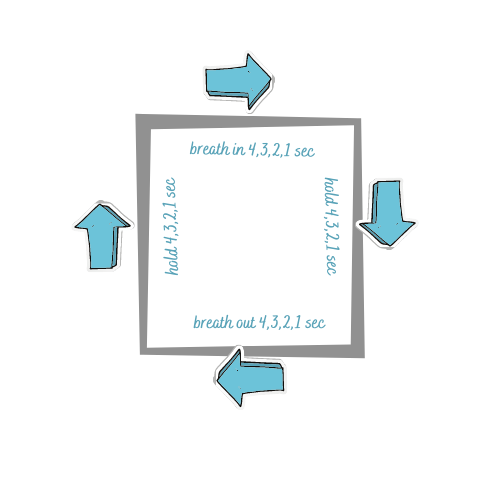
Counselling, support for Anxiety - Aberdeen
“I lied and said I was busy. I was busy; but not in a way most people understand. I was busy taking deeper breaths. I was busy silencing irrational thoughts. I was busy calming a racing heart. I was busy telling myself I am okay. Sometimes, this is my busy - and I will not apologize for it”
— Brittin Oakman/ - Anxiety Doesn’t Knock First
What is Anxiety?
We all experience anxiety. Anxiety is our body’s way of warning us that something stressful, dangerous or unpleasant is about to happen.
When we are faced with a threat, the body sends a signal to the brain. This signal triggers our inbuilt alarm system, the ‘Fight - Flight - Freeze’ response or ‘Stress Response’. This is our body’s natural response to danger, or the perception of danger. Once alerted, a chain of events occurs, our body releases hormones into our system, including adrenaline. Physiological changes will occur, such as an increased heart rate. We may also start to sweat, our pupils will dilate and our breathing becomes harder. These are all normal physiological reactions that enable us to deal with the threat or potential threat. In general, once we have dealt with the threat, our body after a while returns to its normal state of function.
So we can see, anxiety is a normal response to stress and danger.
When we feel anxious, we experience all sorts of thoughts and feelings, including fear, worry and panic. We feel threatened and for some disconnection. Sometimes, these feelings last longer and are much more frequent, they begin to interrupt our daily lives, even after the perceived threat or threat of danger is no longer present. If this continues, we may later be diagnosed with having an ‘Anxiety disorder’.
Anxiety disorders include ‘Panic Disorder’ and ‘Generalised Anxiety Disorder’ (GAD). As explained above, these occur when our responses react in situations that are actually non-threatening. This causes significant emotional, physical and psychological distress and can seriously impact on our day to day living.
General Anxiety Disorder
General Anxiety Disorder is a long-term condition that causes us to feel anxious about a wide variety of situations, events and issues, rather than just one specific thing. We are unable to function and cope in our normal daily lives and activities. Our body refuses to function amid our daily chaos and the anxiety starts to take over. We notice that we are very nervous, even to the point of being physically sick, when thinking of this activity. Something that never used to bother us, suddenly requires massive effort and preparation just to consider it, let alone actually doing it.
For example: if you were mugged on a bus, after a while you might notice that the usual anxiety of catching a bus becomes so strong, that now you try to avoid buses or any crowded spaces, as the stress and panic has become too much. Your body and thoughts are now hijacked by fears and anxiety.
If you have an anxiety disorder, you may also experience other emotional, physiological and psychological symptoms. We do not all feel and react the same.
Symptoms and signs of Anxiety:
Feeling nervous, tense or restless
Feeling constant panic
Not being able to relax
Increased heart rate
Rapid breathing
Sweating
Trouble concentrating
Overthinking
Trouble sleeping
Irritability
Uncontrollable worry
Anxiety may also be a part of other conditions, including:
Post-traumatic stress disorder (PTSD)
Panic disorder
Phobias- such a claustrophobia (fear of enclosed, small spaces) or arachnophobia (fear of spiders)
Social anxiety disorder – a long-term and overwhelming fear of social situations
Separation Anxiety
Obsessive-compulsive disorder (OCD)
Social Anxiety Disorder
We can all feel nervous in social situations, especially if it is a new experience. However, social anxiety disorder is not shyness or nervousness. This type of anxiety will prevent you from engaging in any social situations, even the ones that were organised by your family or friends. You may worry about:
How others see you, what might they think of you?
Will they see you sweat or blush?
Will there be eating?
Will I have to meet other people?
What if I don’t have anything interesting to say?
Will they judge or be critical of me?
These are examples of imposing questions and thoughts that your anxiety is asking before, during and after the social encounter, this might leave you exhausted, lonely and totally overwhelmed.
Simple everyday interactions can cause high levels of worry, anxiety and embarrassment. You may also fear being criticised or judged by others.
Anxiety counselling Aberdeen
Talk to your GP if you feel your anxiety is taking over.
Talking therapy/counselling is also very good to help you understand your anxieties and therefore find ways to live with them.
Breathing techniques - Square breathing.
Support with Anxiety and Panic…
You can also try these simple techniques to help you to gain control and to keep any panic and anxiety at the bay:
Break down the challenge into small steps and take it one step at the time.
For example: if you are worrying about going to a job interview, go to google maps and check out the route, bus stops, car park, even the building itself, to make it all a bit more familiar and therefore a bit less stressful.
Writing down your thoughts can make you feel less anxious.
Think rationally and challenge any anxious thoughts.
Learn what triggers your anxiety, so you can implement your coping skills at the right time, this can be explored further with your therapist.
Understanding what is happening to you - Psychoeducation.
In conversations, try to listen carefully to what others are saying, rather than assuming what they are thinking. REMEMBER- nobody can read other people minds!




